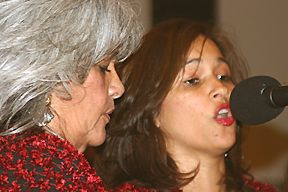Posted: 11/12/04
'Nitty-gritty' work of BGCT reorganization ahead, leaders say
By Marv Knox
Editor
SAN ANTONIO–An initial vote on constitutional revision put the Baptist General Convention of Texas “only partway down the road” toward the BGCT's most significant reorganization in almost five decades, convention leaders said.
Messengers to the BGCT annual meeting in San Antonio approved the first reading of constitutional amendments to reduce the size of the convention's Executive Board by more than half and streamline the convention's decision-making structure.
|
| Rahcael Lampa of the music group Savadore performs at a youth-oriented concert prior to the BGCT annual meeting in San Antonio. |
But to take effect, the amendments must be approved by messengers to next year's meeting, BGCT President Ken Hall said.
And in the meantime, decisions regarding bylaws and procedures that comprise the “nitty-gritty” of the reorganization will be worked out publicly among Texas Baptists, he added.
Hall addressed two question-and-answer meetings before messengers to the annual session voted to affirm the constitutional changes.
Two other primary architects of the reorganization–BGCT Executive Director Charles Wade and Wesley Shotwell, chairman of the group that drafted the governance proposals–also discussed the changes with several hundred messengers.
The proposed reorganization would reduce the size of the Executive Board from 234 to 90 members.
It also would eliminate two coordinating boards, two commissions and the convention's Administrative Committee and assign their responsibilities to new Executive Board committees.
Several participants expressed concern that Texas Baptists–particularly those who live in West Texas and small towns–will lose representation on the BGCT Executive Board. Others said they were alarmed that all the BGCT's 117 associations no longer would be represented on the board.
Still others said the size of the new sectors from which Executive Board representation will be selected prohibit the board members from adequately representing all the churches of their regions.
Acknowledging those concerns, Hall stressed the reason for considering change.
Under the current structure, the Executive Board is responsible for major convention decisions but is not able to hold the convention's administration and other convention organizations accountable, he explained.
And the Executive Board's mammoth size works against good governance, he noted.
“The question is: What is a good size for a governing board?” he added, noting many organizational experts recommend the size should be much smaller than 90.
“Two hundred thirty-four people is more than we have in the state legislature,” he observed.
Good polity demands a governing board be small enough that it can be involved in and knowledgeable about the organization's governance issues and know the executive director well, he said.
Pointing to Buckner Baptist Benevolences, which he heads as president and which has a 27-member board, Hall said: “One of the strengths of our board is that I know my board members and they know me. They hold me accountable.”
The tension of BGCT representation should not be placed upon the Executive Board, he said.
“Obviously, there will be some people who feel under-represented, but it's presumptuous to presuppose representation on the Executive Board. Representation takes place at the BGCT annual meeting,” he said. “The Executive Board is accountable, responsible to the convention. If it is not representative, vote your convictions at the annual meeting.
“The way (governance) is done now is honorable, but it's just not as effective as it could be and should be. … We should have accountability in case something goes wrong.”
Wade said he believes the reorganized structure can fairly represent Texas Baptists.
“Our desire is for everybody to be involved–to hear everybody,” he said, insisting that can be possible through a fairly selected smaller Executive Board.
Besides, proportionate representation doesn't change tremendously from the current system to the proposed system, he added.
For example, he pointed to the Panhandle, South Plains and West Texas regions, which would account for three sectors in the new structure. Together, they would be represented by 10 percent of a 90-member board, whereas now they are represented by 11.4 percent of the current board.
“You're talking about giving up less than 2 percent of the board,” he said.
As participants described their worries that the process is moving too fast and should be delayed, Hall said the first vote on the constitutional change places the convention “only partway down the road” toward overall reorganization.
“We need to take care of the constitution so we can deal with the nitty-gritty pieces of the reorganization,” he said.
That includes a final draft of the sector map, which will determine the geographical dimensions of representation on a new Executive Board; bylaws, which will specifically determine how the decision-making processes will work; and implementation, which will include such details as staff deployment and budgeting.
All of these details will be worked out in the coming year, Hall said, noting they will be decided in conjunction with Texas Baptists representing all kinds of constituencies across the state.
Noting Texas Baptists from rural areas are concerned about losing representation, Hall said he appreciated their concern. However, he said disproportionate representation, which does not account for the cities, "where most of our members live," is not fair to the convention.
Shotwell noted the proposed changes are proactive, placing the convention in a posture to lead change.
“We do not want to allow the things around us to determine how we proceed,” he urged.
Responding to another appeal that small churches will receive less representation, “and they already feel they have no relationship to the BGCT,” Hall contended worrying about the composition of the Executive Board is not the correct approach.
"My bias is that we're not going to get there (to strong relationships with the churches) through governance," he said. "We're going to get there through getting our staff closer to the churches. We need a new staff structure, and we need a new governance structure to hold the staff accountable to the churches and deliver ministries to them.
“We must look at our state. If we want to reach Texas for Christ, we need to be sensitive to where the population is, who Texas is. What we're doing now is not working. We're losing ground. …
“If you postpone (the decision), you're talking about 2006, maybe 2007, before implementation,” he added. “We live in a changing state; we are a changing convention. …
“Make a step of faith in some of us who are working hard. You'll have more to see in the coming year. And if you don't like it then, you can vote it down next year.”
News of religion, faith, missions, Bible study and Christian ministry among Texas Baptist churches, in the BGCT, the Southern Baptist Convention ( SBC ) and around the world.


